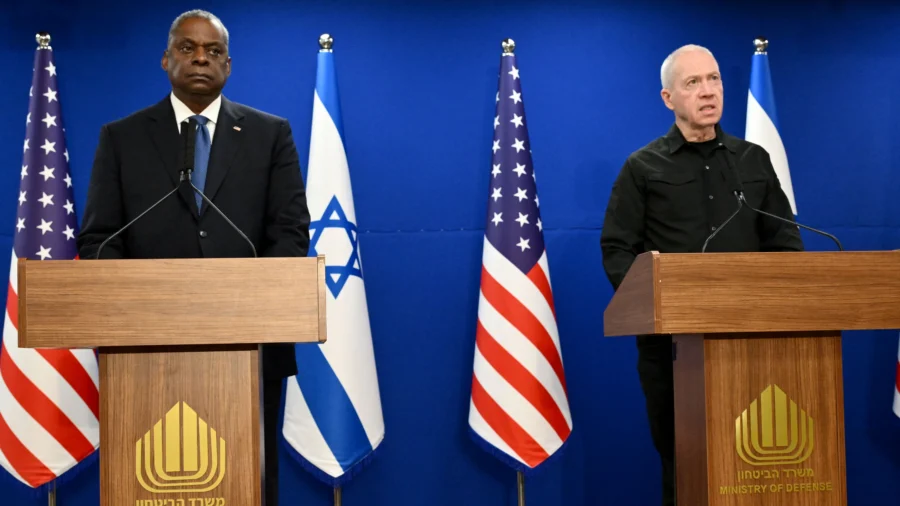U.S. Defense Secretary Lloyd Austin will meet with Israeli Defense Minister Yoav Gallant at the Pentagon on Tuesday, amid growing tension between the administrations of U.S. President Joe Biden and Israeli Prime Minister Benjamin Netanyahu.
Mr. Austin is set to speak with his Israeli counterpart about a range of issues stemming from the Oct. 7 Hamas attack in southern Israel and the Israeli military’s response in the Gaza Strip. According to Pentagon Press Secretary Maj. Gen. Pat Ryder, the discussion will touch on securing the release of hostages taken by the Hamas terrorist group, as well as securing humanitarian aid to Gaza’s civilian population.
Mr. Austin and Mr. Gallant’s discussion will also focus on a disagreement the Biden administration and the Netanyahu government have over whether Israeli forces should conduct a ground offensive in the southern Gazan city of Rafah. The Biden administration has opposed the idea of a Rafah offensive, saying it risks killing large numbers of civilians and disrupting humanitarian assistance to the Gaza Strip, and could turn global public opinion against Israel. Mr. Netanyahu has insisted Israel’s goal of ensuring Hamas’s complete defeat is not possible without an offensive targeting Hamas elements within Rafah.
Some reports have indicated Mr. Gallant also intends to communicate a wish list of weapons the Israeli military hopes the United States will provide on an expedited basis. Maj. Gen. Ryder declined to comment directly on that matter ahead of Mr. Gallant’s meeting with Mr. Austin, stating “I don’t want to speak for Minister Gallant, what he may or may not bring up in the meeting.”
When asked whether Mr. Austin’s views on providing new weapons to Israel has changed, Maj. Gen. Ryder said, “The secretary still believes fundamentally in Israel’s inherent right to defend themselves, and that we will continue to support them in that regard, and that that support is ironclad. I’ll just leave it there.”
Rift Growing Between Biden and Netanyahu
The meeting between Mr. Austin and Mr. Gallant also comes a day after the U.S. delegation at the United Nations abstained from voting on a resolution demanding a ceasefire in the ongoing Gaza conflict.
The United States had vetoed three previous U.N. Security Council resolutions demanding a ceasefire but declined to exercise its veto power when this latest ceasefire resolution came up for a vote. The Netanyahu government had hoped the U.S. delegation would veto this latest ceasefire resolution and canceled an Israeli diplomatic visit to Washington D.C. in protest of the U.S. delegation’s decision to abstain.
On Monday, State Department spokesman Matthew Miller said the U.N. Security Council resolution had fulfilled a U.S. desire to link the implementation of a ceasefire to the release of hostages held in the Gaza Strip, but said the U.S. delegation ultimately abstained from the vote because the resolution lacked a clear condemnation of Hamas.
Mr. Netanyahu’s office insisted the Security Council resolution did not clearly make a ceasefire contingent on the release of Israeli hostages, and accused the U.S. delegation of abandoning its prior policy of conditioning a ceasefire period on the release of hostages.
The disagreement over this U.N. Security Council resolution is not the first sign of strained relations between the Biden administration and the Netanyahu government.
Senate Majority Leader Chuck Schumer (D-N.Y.), a key political ally of President Biden, also elicited pushback from the Netanyahu government when he described Mr. Netanyahu and “radical right-wing Israelis” across the current Israeli government and society as an obstacle to peace and called for new elections in Israel in a March 14 Senate floor speech.
Israeli Ambassador to the United States Michael Herzog responded to Mr. Schumer’s speech, saying it’s not only “unhelpful” but “counterproductive” to “comment on the domestic political scene of a democratic ally.”
President Biden said he had foreknowledge of Mr. Schumer’s March 14 speech and declined to criticize the timing or tenor of the Senate majority leader’s remarks.
“[Mr. Schumer] made a good speech, and I think he expressed a serious concern shared not only by him but by many Americans,” President Biden said.


